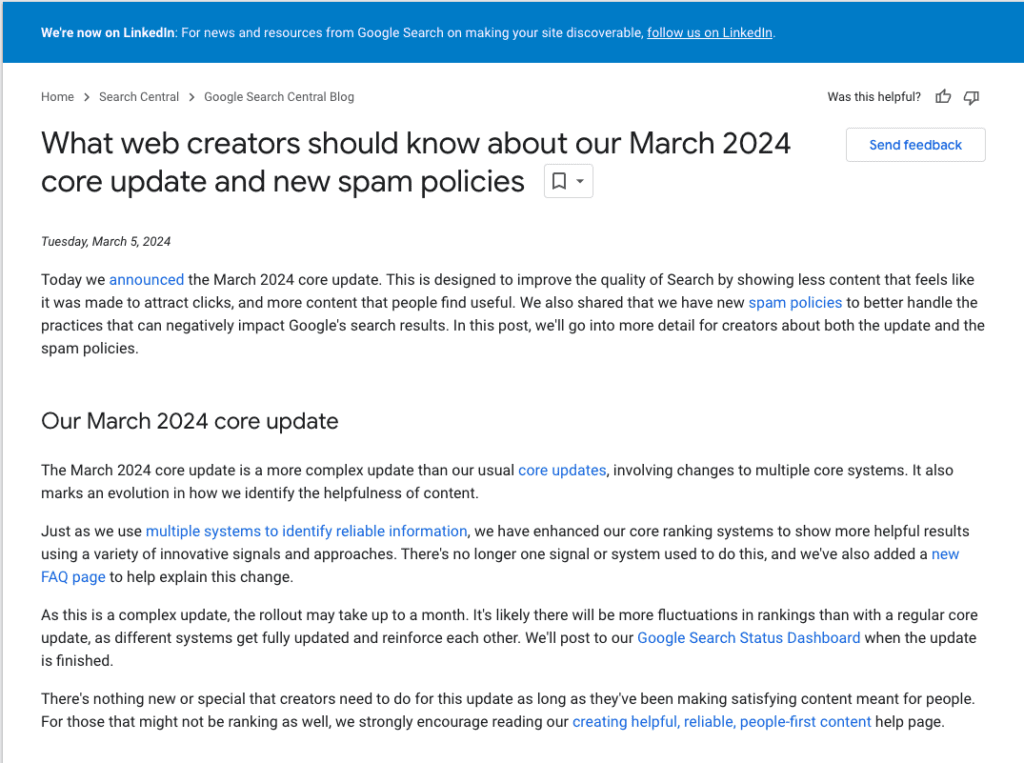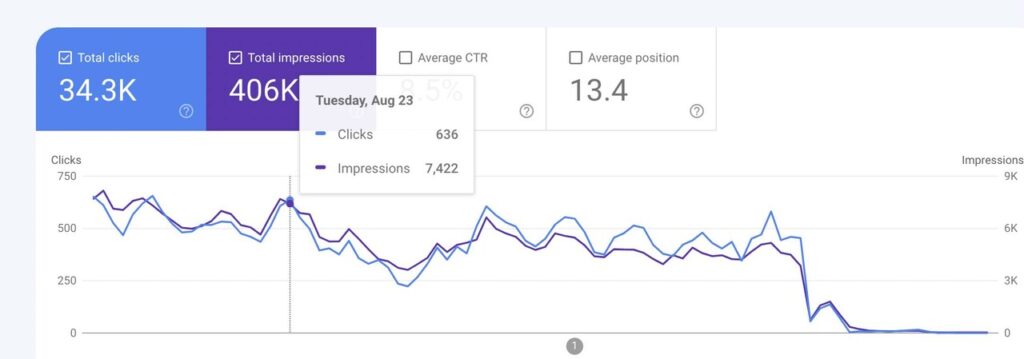Introduction: Understanding Google’s Algorithm Updates
Google’s algorithm updates are a constant evolution, reshaping how websites rank in search results. Staying ahead of these changes is crucial for any website owner or SEO specialist. Imagine your website as a storefront; if Google updates its “map” and you’re not on it, potential visitors won’t find you. For example, the March 2024 Core Update integrated the Helpful Content system, emphasizing original, user-centric content over click-bait articles. This shift means that content quality and user experience, such as mobile-friendliness and page speed, are now more critical than ever. Understanding these updates and adjusting your SEO strategy accordingly can make a significant difference in maintaining and improving your website’s visibility in search results. Keep reading to uncover the latest changes and learn how to optimize your site effectively.
Overview of Recent Google Algorithm Updates
Google’s algorithm updates can significantly impact your website’s search rankings. The latest changes include the March 2024 Core Update, which integrates Google’s Helpful Content system, emphasizing original, high-quality content over click-bait. This update aims to enhance user experience by prioritizing mobile-friendliness and page speed, essential factors in today’s SEO strategy.
For example, websites that regularly publish engaging content saw a boost in their rankings, reflecting Google’s commitment to rewarding consistency and quality. Additionally, the February 2024 Spam Policy Updates targeted low-quality, spammy content, making it crucial for site owners to focus on producing valuable and trustworthy information.
In November 2023, Google rolled out two significant updates: a Core Update and a Reviews Update. These updates have caused noticeable ranking fluctuations, highlighting the need for continuous monitoring of your website’s performance using tools like Google Search Console.
Staying informed about these updates helps you adapt your SEO strategy effectively. For instance, by focusing on mobile-first indexing and improving page speed, you can better align with Google’s evolving criteria. Understanding and adapting to these algorithm updates is vital for maintaining and improving your website’s visibility in search results. Keep your content relevant, user-focused, and technically sound to navigate these changes successfully.
Key Features of the Latest Updates
- Original, High-Quality Content: Rewarded by the Helpful Content system.
- De-emphasis on Backlinks: Focus on user experience and relevance.
- Mobile-First Indexing: Prioritizes mobile versions of websites.
- Spam Policy Updates: Targets low-quality, manipulative content.
Understanding these features and adjusting your SEO strategy accordingly can help maintain and improve your website’s visibility in search results.
The latest Google algorithm updates have introduced several key features that can significantly impact your website’s SEO strategy. First and foremost, the March 2024 Core Update emphasizes the importance of original, high-quality content. Google’s Helpful Content system is now integrated into the core algorithm, rewarding content that genuinely assists users rather than just attracting clicks. For example, a tech blog that provides in-depth reviews and how-to guides will likely see improved rankings compared to a site filled with superficial listicles.
Another critical feature is the de-emphasis on backlinks as a primary ranking signal. Historically, backlinks were crucial, but Google now focuses more on user experience and content relevance. Sites need to ensure their content is engaging and valuable, meeting the E-E-A-T (Experience, Expertise, Authoritativeness, Trustworthiness) criteria.
Impact of the March 2024 Core Update

- Content Quality: High-quality, original content is rewarded.
- Backlink Importance: Reduced in favor of user experience.
- Mobile-First Indexing: Critical for SEO success.
- Stricter Spam Policies: Targets manipulative practices.
The March 2024 Core Update has had a profound impact on website rankings, shaking up the SEO landscape. This latest Google algorithm update places significant emphasis on original, high-quality content that truly benefits users. Websites that offer in-depth, well-researched articles are rewarded, while those relying on click-bait or thin content see a decline. For instance, a health blog providing detailed, expert-backed advice on managing chronic conditions is likely to fare better than a site filled with generic health tips.
A notable change is the reduced importance of backlinks. While backlinks still matter, Google now prioritizes user experience and content relevance. Sites must focus on delivering engaging, valuable content that meets the E-E-A-T (Experience, Expertise, Authoritativeness, Trustworthiness) standards.
Mobile-first indexing has also been reinforced. Google now evaluates the mobile version of your website first, so it’s crucial to optimize for mobile performance. This includes ensuring fast load times and a user-friendly design across all devices.
Additionally, the update includes stricter spam policies. Google targets websites engaging in manipulative link schemes or producing low-value content for link manipulation. Such sites are more likely to be penalized, underscoring the need for authentic, user-centric content.
Adapting Your SEO Strategy to the Latest Updates
- Content Audit: Identify and improve weak content.
- Mobile Optimization: Enhance mobile performance and user experience.
- User Engagement: Focus on keeping visitors engaged and reducing bounce rates.
- Natural Backlinks: Earn backlinks through quality content, not manipulative practices.
Adapting your SEO strategy to the latest Google algorithm updates is crucial for maintaining and improving your site’s search rankings. With the March 2024 Core Update, the focus has shifted to high-quality, original content. Websites should prioritize creating valuable, user-centric content that answers users’ queries comprehensively. For example, if you run a travel blog, provide detailed guides, insider tips, and engaging stories that offer real value to readers.
Start by performing a content audit to identify areas needing improvement. Ensure your content aligns with E-E-A-T principles. Update or remove thin or outdated content, and expand on topics where your expertise shines.
Mobile-first indexing is more critical than ever. Make sure your website is fully optimized for mobile devices. This includes improving page speed, ensuring responsive design, and enhancing the overall user experience. Use tools like Google’s PageSpeed Insights to identify and fix performance issues.
With the decreased emphasis on backlinks, focus more on user engagement metrics. Encourage longer visits and lower bounce rates by improving site navigation and internal linking. Engaging content, interactive elements, and a seamless user experience can boost your site’s performance.
To adapt to stricter spam policies, avoid manipulative SEO tactics. Ensure all your backlinks are natural and earned through high-quality content. Use tools like Google Search Console to monitor your site for any spam issues and address them promptly.
Case Studies: Websites Affected by the Updates

The latest Google algorithm updates have had notable impacts on various websites, highlighting the importance of adapting SEO strategies. One travel blog, for instance, saw a significant drop in rankings after the March 2024 Core Update. Their content, while abundant, lacked depth and originality. By focusing on comprehensive, user-centric guides and leveraging their unique travel experiences, they managed to recover their rankings within three months.
Conversely, a health and wellness site experienced a surge in traffic due to its high-quality, expert-driven articles. Their adherence to the E-E-A-T principles (Experience, Expertise, Authoritativeness, Trustworthiness) paid off, aligning perfectly with Google’s updated criteria.
A tech review website faced penalties due to manipulative link practices identified by the February 2024 Spam Policy Updates. After cleaning up their backlink profile and focusing on authentic, high-value reviews, they gradually regained their visibility.
Key Lessons:
- Travel Blog: Enhanced content depth and originality led to recovery while updating the old content of the website to keep the crawlers busy on the website.
- Health Site: High-quality, expert content saw a traffic boost, along with high DA websites
- Tech Review Site: Cleaning up spammy backlinks and focusing on authentic content improved rankings.
Expert Opinions on the Algorithm Changes
Experts agree that the latest Google algorithm updates are a game-changer for SEO. John Mueller from Google emphasizes the importance of focusing on user-centric content and quality over quantity. He points out that sites excelling in the E-E-A-T principles are reaping the benefits of these updates. Marie Haynes, an SEO consultant, highlights that the reduced emphasis on backlinks shifts the focus to user engagement and content relevance. She advises regularly updating content to maintain its value and align with Google’s evolving standards. SEO guru Neil Patel suggests leveraging tools like Google Search Console to monitor site performance and adapt strategies swiftly, ensuring compliance with the latest updates.
These insights underline the need to prioritize high-quality, original content and user experience to navigate the changing SEO landscape successfully.
Best Practices for Future-Proof SEO
Adapting to Google’s algorithm updates requires implementing best practices to future-proof your SEO strategy. First and foremost, prioritize high-quality, original content that meets E-E-A-T (Experience, Expertise, Authoritativeness, Trustworthiness) standards. For instance, a food blog that shares unique recipes with detailed cooking tips and personal anecdotes will engage readers more effectively than generic posts.
Optimize your website for mobile-first indexing, ensuring a seamless user experience across all devices. Fast-loading pages, intuitive navigation, and responsive design are essential. Utilize Google’s PageSpeed Insights to identify and fix performance issues.
Engage your audience with consistent, valuable content. Regularly update your blog or website to keep it fresh and relevant. For example, a tech blog that publishes weekly in-depth articles on the latest gadgets and updates past posts to reflect new information will retain reader interest and perform well in search rankings.
Additionally, earn natural backlinks by producing content that others want to reference. Avoid manipulative link schemes and focus on building genuine relationships with other websites. Monitor your site’s performance using tools like Google Search Console and adjust your strategy based on insights and trends.
Key Practices:
- Quality Content: Focus on E-E-A-T principles.
- Mobile Optimization: Ensure fast, responsive design.
- Consistent Updates: Regularly refresh and add new content.
- Natural Backlinks: Build genuine, high-quality links.
FAQs on Latest Google Algorithm Updates
What are the latest Google algorithm updates?
Google has recently rolled out the March 2024 Core Update, which focuses on improving the quality of search results by integrating the Helpful Content system. There were also significant spam policy updates aimed at reducing low-quality, spammy content.
How do I know if my website is affected by an update?
You can monitor your website’s performance using Google Search Console. Look for sudden drops in impressions and click-through rates that coincide with the dates of known updates. Analyzing specific pages and queries that were impacted can also provide clues.
What steps can I take to recover from a ranking drop?
Start by enhancing the quality and relevance of your content, ensuring it meets Google’s guidelines for helpful content. Improve technical SEO aspects like site speed and mobile-friendliness. Regularly publish engaging, high-quality content and utilize structured data to enhance visibility in SERPs.

